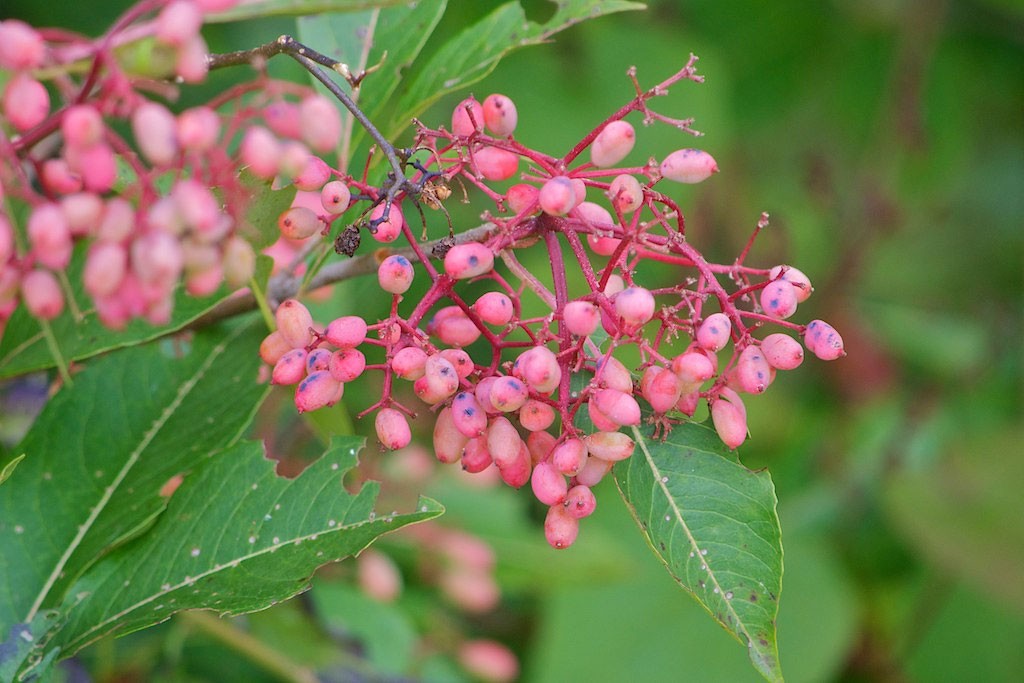Wild raisins and smelly socks

Wild raisin (Viburnum cassinoides). The leaves smell bad, the fruit tastes good. Photo: Distant Hill Gardens, Creative Commons, some rights reserved
Hunters, hikers, and others who spend much time in the woods between mid-September and early December will at some point encounter a pungent smell akin to a rank locker room or an overripe laundry basket. Often this happens in or near wetlands, and the odor is strongest in the morning when the sun first hits.
The culprit is one or more of the many native shrubs and small trees in the genus Viburnum such as wild raisin, arrowwood and nannyberry. These humble plants are found throughout the Northeast in fencerows, old pastures, forest edges, and especially in wet areas. They provide essential cover and nesting habitat for songbirds, and in late summer they bear sweet berries that are relished by birds and outdoor enthusiasts alike.
As viburnum leaves start to break down they give off butyric acid, a noxious chemical that in its pure form is listed by the EPA as a toxic substance. Its smell has been likened to rancid milk, stinky feet, and extreme body odor (but not necessarily all blended together). Aside from a few industrial uses, butyric acid is added to some carp-fishing bait and has been found in homemade stink bombs deployed by pranksters and activists. Incidentally, it’s also an ingredient in rooting compounds used in the nursery trade to propagate woody plants, including viburnums.

Highbush cranberry (Viburnum trilobum) The leaves smell bad. The fruit is edible, sort of. Photo: US Fish and Wildlife Service
Some viburnums even have butyric acid in their fruit. The highbush cranberry is case in point. It’s not actually a cranberry but it is a high bush, so whoever named it got it half right. Sometimes used in landscaping, it has translucent red berries which persist into the winter. The fruit is edible, in a technical sense, but let’s just say it’s an acquired taste.
Like all viburnums, highbush cranberry shrubs have no thorns, are not invasive, and don’t cause rashes. Why these otherwise amiable plants make their berries, which are supposed to entice birds to eat them and spread the seeds, into little stink bombs is a mystery.
Why viburnums make smelly leaves is also unknown. I imagine butyric acid might repel herbivores, at least temporarily, but it doesn’t seem like a strong enough advantage to be selected for over time. It could possibly inhibit competing vegetation, though, something known as allelopathy. To my knowledge this has not yet been studied, but it could be done fairly easily. But why anyone would want to do it, other than to satisfy the curiosity of a few plant enthusiasts, is another question.
Of all viburnums, the leaves of wild raisin (V. cassinoides) may be the most pungent. It’s easy to forgive its funk because it has the tastiest fruit. From late August through the fall and sometimes into early winter you can find sweet, dark purple “raisins” in wetlands and on the edges of ponds. Relative to the size of the fruit, the seed is rather large, but the flavor and sweetness make up for it. Sometimes the stinky-sock odor is what alerts me to the presence of this plant, and I’ve sniffed out some good wild raisins that way.
I think everyone who enjoys the outdoors should get acquainted with wild raisin, which can provide a welcome snack on a cold day. Hunters and hikers have an added incentive to learn about the odoriferous leaves of wild raisin and other viburnums: The story of their butyric acid-based smell could come in handy as a cover for one’s honest-to-goodness offensive foot odor back at deer camp or inside a cramped tent.
Paul Hetzler is a horticulture and natural resources educator with Cornell Cooperative Extension of St. Lawrence County.







